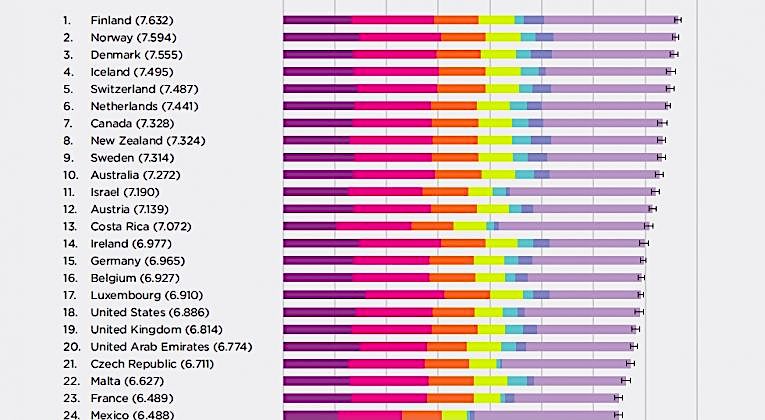One of the most pernicious, “dangerous, anti-human and soul-crushing” myths in the business world, writes Liz Ryan at Forbes, is the “idiotic nostrum” that has also crept into government and charitable work: “If you can’t measure it, you can’t manage it.” The received wisdom is sometimes phrased more cynically as “if you can’t measure it, it didn’t happen,” or more positively as “if you can’t measure it, you can’t improve it.”
But “the important stuff can’t be measured,” says Ryan. Don’t we all want to believe that? “Can’t Buy Me Love” and so forth. Maybe it’s not that simple, either. Take happiness, for example. We might say we disagree about its relative importance, but we all go about the business of trying to buy happiness anyway. In our hearts of hearts, it’s a more or less an unquestionable good. So why does it seem so scarce and seem to cost so much? Maybe the problem is not that happiness can’t be measured but that it can’t be commodified.
Buddhist economies like Bhutan, for example, run on a GHI (Gross National Happiness) index instead of GDP, and pose the question of whether the issue of national happiness is one of priorities. In other words, “you get what you measure.” In March, Laura Begley Bloom cited the 20 happiest countries in the world at Forbes, using the UN’s 2020 World Happiness Report, “a landmark survey of the state of global happiness,” as the report’s website describes it, “that ranks 156 countries by how happy their citizens perceive themselves to be.”

Happiness is measured across urban and rural environments and according to environmental quality and sustainable development metrics. The report uses six rubrics to assess happiness—levels of GDP, life expectancy, generosity, social support, freedom and corruption, and income. Their assessment relied on self-reporting, to give “a direct voice to the population as opposed the more top-down approach of deciding ex-ante what ought to matter.” The last chapter attempts to account for the so-called “Nordic Exception,” or the puzzling fact that “Nordic countries are constantly among the happiest in the world.”
Maybe this fact is only puzzling if you begin with the assumption that wealthy capitalist economies promote happiness. But the top ten happiest countries are wealthy “socialist friendly” mixed economies, as Bill Maher jokes in the clip at the top, saying that in the U.S. “the right has a hard time understanding we don’t want long lines for bread socialism, we want that you don’t have to win the lotto to afford brain surgery socialism.” This is comedy, not trenchant geo-political analysis, but it alludes to another significant fact.
Most of the world’s unhappiest countries and cities are formerly colonized places whose economies, infrastructures, and supply chains have been destabilized by sanctions (which cause long bread lines), bombed out of existence by wealthier countries, and destroyed by climate catastrophes. The report does not fully explore the meaning of this data, focusing, understandably, on what makes populations happy. But an underlying theme is the suggestion that happiness is something we achieve in real, measurable economic relation with each other, not solely in the pursuit of individualist ideals.
Related Content:
How Much Money Do You Need to Be Happy? A New Study Gives Us Some Exact Figures
Josh Jones is a writer and musician based in Durham, NC. Follow him at @jdmagness


Gee, by this measure, the North Koreans should be the happiest people on earth!
Just so you know… Switzerland is not a very “socialist friendly” country.
I think the journalist has mistaken Switzerland for Sweden. Swiss government is very much on the libertarian right politically.
The happiest country (Finland) is both very capitalist (not socialist) and among the least diversified nations in the world with 98.5% white and huge hurdles to immigrate to Finland.
Are these things what really make Finland the happiest nation on earth?
Finland — socialism friendly — what a joke! Actually we believe in market economy and capitalism. Our economic system is not as full of restrictions and barriers to market entry as it is in the United States. And we do not make appendicitis surgery or childbirth or cancer treatment so impossibly expensive that people get into debt for years.
Leave out least divserfied. The top 10 happiest countries are 98% whites. Then look at the bottom of the list to see that these countries are also least diversified.
Look at the bottom of the originated list at countries ranked 143–153. https://worldhappiness.report/
A strong social safety net is socialism. All countries have socialism. The countries with more socialism (social programs) meet the needs of their populations more adequately.